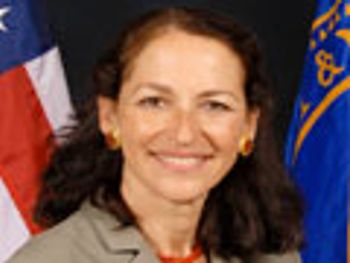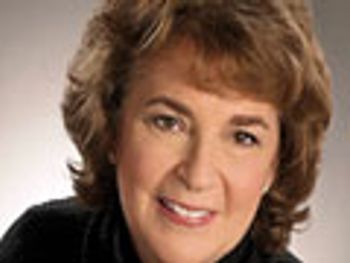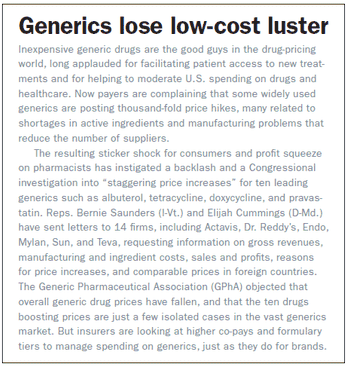
Widespread use and abuse of opioid painkillers is prompting efforts to develop new drugs and formulations that resist abuse while providing relief to legitimate patients, writes Jill Wechsler.
Jill Wechsler is Pharm Exec's Washington Corespondent

Widespread use and abuse of opioid painkillers is prompting efforts to develop new drugs and formulations that resist abuse while providing relief to legitimate patients, writes Jill Wechsler.

After hearing “strong views” on the issue, FDA is expected to release biosimilar-naming guidance later this year.

Current clinical trials are regarded as “too slow, too expensive, not reliable, and not designed to answer the important questions,” according to FDA’s new deputy commissioner for medical products &tobacco, Robert Califf.

The revised Cures proposal makes it easier for pharma to distribute journal articles and medical textbooks to physicians, but it also drops provisions that provided added exclusivity for certain new therapies.

Demands from patient advocacy groups for broader subgroup representation in clinical trials has generated a new drug trial transparency initiative at the Center for Drug Evaluation and Research (CDER).

The industry continues to puzzle over FDA's proposed regulation of mobile medical apps (MMAs), writes Jill Wechsler.

Rampant concerns about the affordability of, and access to, new life-saving therapies is widening the debate over how much society should pay for new biomedical discoveries, writes Jill Wechsler.

FDA commissioner Margaret Hamburg has received praise and plaudits as she exits the Food and Drug Administration this week after six years on the job.

A controversial FDA proposal to alter the process for making changes to approved drug labels has drawn opposition and support in equal measure, writes Jill Wechsler.

Congress, Obama offer strategies to reduce regulatory roadblocks to new breakthroughs.

The Securities and Exchange Commission (SEC) is focusing more on the accuracy and timeliness of biopharma company financial filings, particularly those related to regulatory actions involving FDA, writes Jill Wechsler.

The approval of the first biosimilar for market in the U.S. highlights the importance of further clarification from FDA on key policies related to the development and prescribing of highly similar biologics for patients, writes Jill Wechsler.

Drug shortages are declining, but they’re still a serious concern for regulatory authorities, policy makers and biopharma manufacturers, writes Jill Wechsler.

The ongoing battle over drug reimbursement and pricing has raised questions about whether the pharmaceutical industry can continue to rely on high U.S. revenues to fund biopharmaceutical R&D.

President Obama has unveiled his $215m “Precision Medicine Initiative” to support the future biomedical research, while calling for a reduction in exclusivity on brand biologics from 12 to 7 years and a curb on "evergreen” patents on certain biologics. Jill Wechsler reports.

FDA officials have been busy rolling out advisories for pharma marketers, and there’s no let-up in sight, writes Jill Wechsler.

The "discussion draft" for legislation to speed "21st Century Cures" to patients emerged very quietly on Capitol Hill this week. Jill Wechsler reports.

FDA's Office of Hematology and Oncology Products (OHOP) is testing a treamlined review process that could be much faster and less costly for certain therapies. Jill Wechsler reports.

Several vaccine candidates are moving into larger clinical trials, supported by government and industry efforts to address manufacturing and research challenges. Jill Wechsler reports.

Investigators and sponsors of clinical trials will have to make more detailed data available following study completion, according to a new report from an Institute of Medicine (IOM) expert panel.

The main surprise at the Jan. 7, 2015 meeting of FDA’s Oncologic Drugs Advisory Committee was the panel’s strong support for a drug developed under a very different model from most cancer therapies, writes Jill Wechsler.

FDA has scheduled a public meeting in early January to assess and weigh the data on the first U.S. application for a biosimilar therapy.

Foreign governments are enacting anti-fraud legislation as part of broader efforts to crack down on corrupt practices involving pharmaceutical companies and healthcare professionals.

The Patient-Centered Outcomes Research Institute (PCORI) is launching a $50 million program to fund research on the comparative effectiveness of various approaches for diagnosing and treating hepatitis C.

US researchers and regulators continue to support the use of randomized clinical trials to test potential treatments and vaccines to combat the Ebola virus, despite objections that this approach is unethical and unfair to vulnerable populations

The Food and Drug Administration is moving fast to implement the drug compounding provisions of new Drug Quality and Security Act (DQSA), issuing new guidance to spur registration by outsourcing facilities just days after President Obama signed the new bill into law.

The 2014 mid-term elections handed over control of the Senate to Republicans and boosted the GOP majority in the House, a clear blow to Obama administration policies, including the president’s landmark health reform initiative.

A federal policy issued late last week appeared to deal a serious blow to continuing medical education (CME) programs supported by biopharma companies. But the specifics published by the Centers for Medicare and Medicaid Services (CMS) Oct. 31, 2014 actually continue to exempt independent CME funding from the Open Payments reporting requirements for transfers of value from manufacturers to prescribers.

Insurers, physicians attack high-cost therapies in anticipation of specialty drug surge.

After almost two years of anticipation, Janet Woodcock, director of the Center for Drug Evaluation and Research, has administration approval for organizational changes to bolster programs and policies to ensure drug quality.